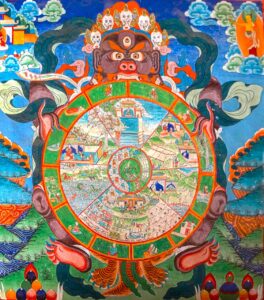DHARMA THEMES AT MWS
CAUSE AND EFFECT
BIG IDEAS: I notice and celebrate all the causes and conditions that brought me to this present moment. I practice wholesome actions to bring goodness into the world.
How do my thoughts, words, and actions affect living and nonliving things around me?
Everything that arises has a cause and everything that exists has an effect. Because cause and effect is a natural part of being human, it’s a rich area of study for young children finding their way in the world. In Buddhism, the law of cause and effect is known as karma (Sanskrit) or kamma (Pali). And the antidote to negative karma is creating virtuous habits. We find guidance in the the Five Precepts (Buddhist code of conduct), Ten Negative Actions, Eightfold Path and so on. Put simply, whatever we do with our body, speech, and mind will have a corresponding effect. Intention is very important when we talk about karma. Everything we do begins with an intention, which leads to an action, followed by the effect of that action—either immediately or in the long term, tangibly or imperceptibly. In Buddhism this is represented in the Wheel of Life and the 12 nidanas.
There are countless causes and conditions that are shaping our experience every moment of the day. A cause is whatever is the main contributor to an effect, for example, a seed that is planted. Conditions are the situations around it that allow a cause to take fruit, for example the soil, air, water, and temperature that are required for a seed to grow. While we share many conditions, everyone has a unique set of circumstances so everyone has a unique perspective.
Seeing the world in this way, naturally leads to a disposition of empathy and compassion, and an appreciation of the complexities of this human existence. Seeing the big picture, one is less likely to grip too rigidly to one perspective and therefore conflict can be transformed into compassion. we realize how connected we all are to the vast seen and the unseen world; we are not independent individuals, but rather links in a chain of relationships and that each link—what we consider the “self” —is also a system of connections. Reverence, awe, and the ability to be present and awake naturally arise.
RESOURCES
WEB PAGE: Rigpa Wiki web page on Karma – a good quick read
PODCAST: Dependent Origination, Noah Rasheta, Secular Buddhism Podcast
VIDEO: Understanding the Law of Karma, Noah Rasheta, Secular Buddhism Podcast
PODCAST: Judy Lief Episode 48 – (8 min) Not Harming (the first precept)

JOIN US!
All are welcome to join the Dharma Committee at any time. We currently meet in person monthly. It’s a joy! To learn more, please contact the Dharma Committee Executive Committee at [email protected].

